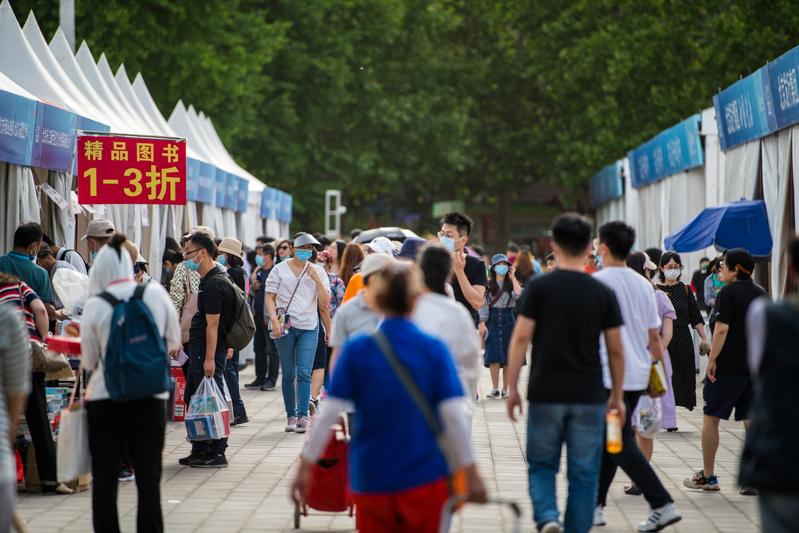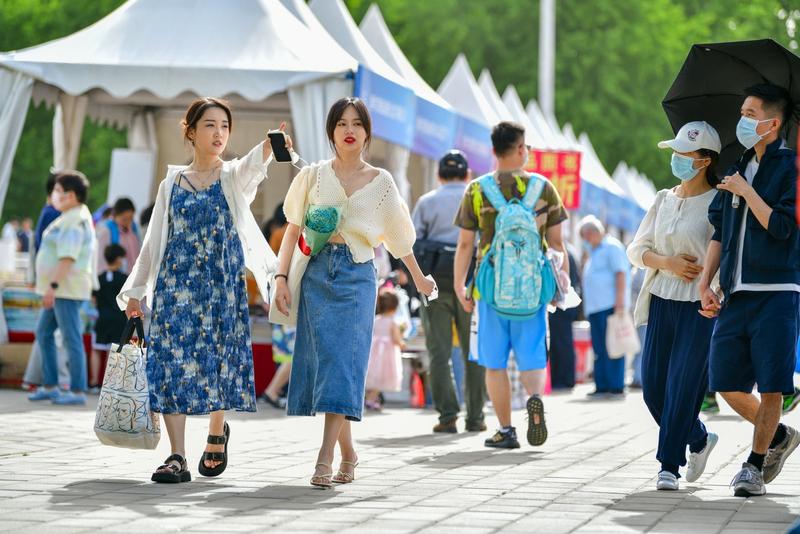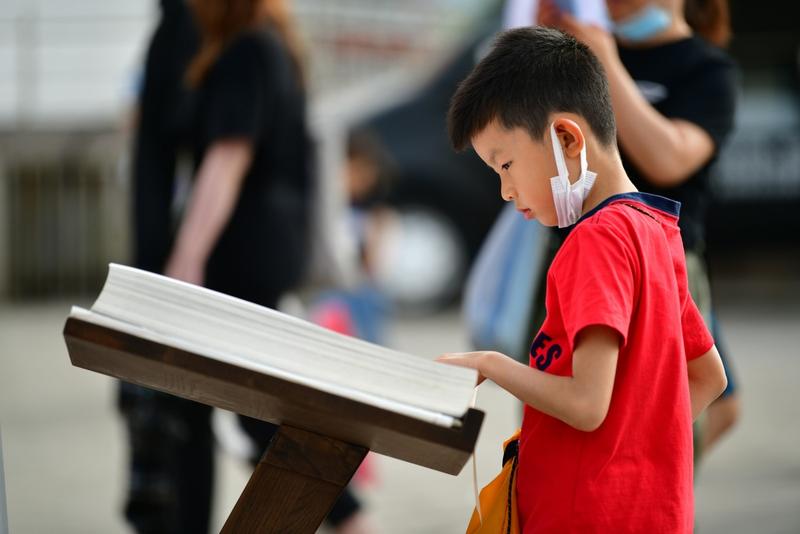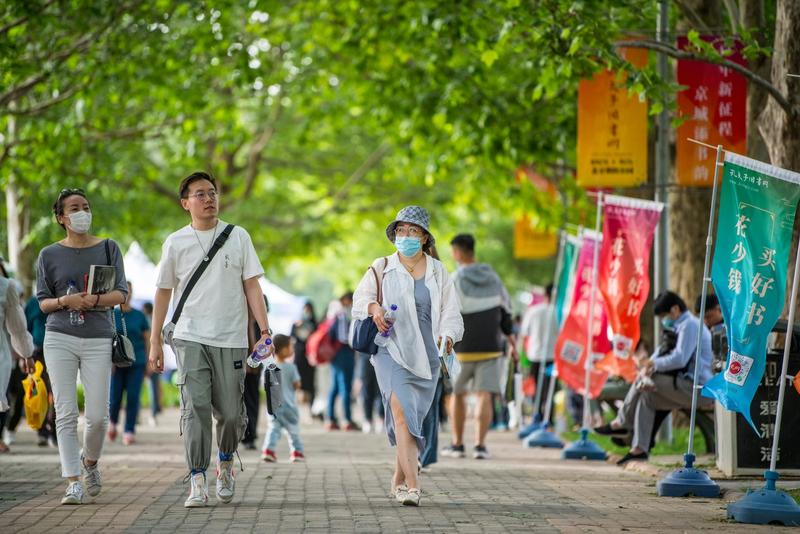Young people eager to keep turning the pages
 People attend the Beijing Book Fair at Chaoyang Park in May. The event, which attracted more than 300,000 visitors, has been held annually since 1979. (PHOTO PROVIDED TO CHINA DAILY)
People attend the Beijing Book Fair at Chaoyang Park in May. The event, which attracted more than 300,000 visitors, has been held annually since 1979. (PHOTO PROVIDED TO CHINA DAILY)
More than 2,000 years ago, the Roman scholar and philosopher Marcus Tullius Cicero reached the conclusion that, "A room without books is like a body without a soul."
In modern times, bookstores and book fairs play valuable roles in the cultural life of a city.
Beijing, which has a history of more than 3,000 years, boasts a rich cultural heritage, with officials and the public making every effort to keep the tradition of reading alive for future generations.
Visitors have been attending book fairs in the Chinese capital since the 1950s. A book fair held in Beijing by Xinhua Bookstore in November 1957 was the first of its kind after the founding of New China in 1949, according to Beijing Daily.
The 10-day event attracted people from all areas of the city who were eager to broaden their knowledge.
The organizer of the fair sold imported books and newly published works. Some 20 well-known writers, including Mao Dun and Zang Kejia, attended the event to meet fans and sign books.
 The Beijing Book Fair, which ran for 11 days in May, attracted many young readers. (PHOTO PROVIDED TO CHINA DAILY)
The Beijing Book Fair, which ran for 11 days in May, attracted many young readers. (PHOTO PROVIDED TO CHINA DAILY)
In 1979, Xinhua Bookstore held a second book fair on a much larger scale than the event in 1957. Beijing Daily reported that more than 344,000 books were sold during the first three days of the fair, bringing in revenue of 170,000 yuan (US$26,225).
The fair, which was well-received by the public, has been held annually ever since.
In the 1990s, the fair attracted not only local residents, but also book lovers from nearby provinces.
A Beijing Daily report on the fair held in 1992 stated: "A teacher named Li Baozhong from neighboring Hebei province took a train to Beijing. In less than two hours at the fair, he spent more than 300 yuan on buying books-the equivalent of two months' salary."
In 2009, the number of people attending the fair fell by 50 percent year-on-year to 300,000, due largely to booming online shopping and digital reading.
Zhao Zhan, a 35-year-old Beijinger, who has many happy memories of attending the book fair, said, "There appeared to be no stopping the decline in its popularity-something I felt very sad about.
 The Beijing Book Fair, which ran for 11 days in May, attracted many young readers. (PHOTO PROVIDED TO CHINA DAILY)
The Beijing Book Fair, which ran for 11 days in May, attracted many young readers. (PHOTO PROVIDED TO CHINA DAILY)
"When I was young, the book fair were held in Ditan Park, which has a good natural environment. I loved to read in the open air amid trees and bushes before taking many books home."
Zhao said he used to visit the book fair with his mother. When he grew older, he went to the event with his girlfriend.
"When you read, it's like having a mental dialogue with the authors. It feels even better attending the fair with your loved ones," he said.
In 2012 and 2013, the Beijing Book Fair was suspended due to weak demand, leaving many fans such as Zhao heartbroken.
"I broke up with my girlfriend in 2013, when the fair was suspended. These two occurrences were not related in any way, but they were both pretty sad for me. Some of my memories had died," he said.
In 2014, when the event was relocated to Chaoyang Park, the latest promotional methods were used to encourage loyal supporters to return, and also to attract new fans.
 The Beijing Book Fair, which ran for 11 days in May, attracted many young readers. (PHOTO PROVIDED TO CHINA DAILY)
The Beijing Book Fair, which ran for 11 days in May, attracted many young readers. (PHOTO PROVIDED TO CHINA DAILY)
Latest trend
In view of the wealth of information available in the digital world, many people consider reading books to be old-fashioned.
For the majority of young people though, reading physical books has become popular, with many of them avidly turning the pages at every opportunity.
This year, the Beijing Book Fair, which was held in Chaoyang Park for 11 days from May 14, attracted more than 300,000 visitors.
Dong Yijin, a high school art teacher from Shanxi province who traveled to the capital to attend the event, said: "I love books on painting techniques, art theories and collections of artistic works, but they are usually expensive. At the book fair, I can buy such books at a 60 percent discount, which is a very good deal.
"It's not a good idea to buy these books online, as you cannot feel the quality of the paper."
Holding a bag full of huge books, Dong moved quickly among the booths to select the titles she needed.
Many readers headed for the Beijing Arts and Photography Publishing House booth for works on The Louvre, Roman and Gothic arts, which cost 998 yuan (US$154) each.
Editors from the publishing house said its newest and best books were displayed, rather than low-priced titles.
Dong said she did not mind paying for such works, as long as they were worth the money.
Lin Fan, 30, a Beijinger who read numerous comic books at a booth displaying old titles, said, "I found many comic book series at the fair in previous years, which was great fun for me, as they bring back memories."
Displaying old and secondhand books is a tradition at the Beijing Book Fair, as many fans visit it in search of such volumes.
However, some visitors are seeking new books, while others simply want to enjoy the atmosphere at the event.
Lin Leilei, who is in her 30s and brought her 5-year-old daughter to the fair, said they enjoyed a good family time at the event.
"I love reading books, but I seldom have the time to do so. To bring my daughter here and select some children's books that she likes is both meaningful and relaxing," Lin said.
To attract the younger generation, including children, the organizer of the book fair added a number of activities.
The 500-square-meter square in Chaoyang Park was transformed into a "good luck" book market, where people could read, buy secondhand books and play outdoor games.
The organizer said most of the 10,000 books sold in this area were business management and children's titles. In addition to booths selling these books, 56 individuals were selected from 300 people who applied to sell their books online.
One woman selling books said: "It's a good way of communicating between book fans. It's a valuable experience talking with people who buy my books, as they have similar tastes as myself."
The organizer said this year's fair covered a total area of 10,000 square meters and included books, displays of innovative cultural works and a family zone.
Numerous events involving books were held, such as a theme day, book launches, signings, a reading forum and cultural shows.
Lin said: "It's all about culture, which is rooted deeply in Beijing. If I had the time, I would love to spend several days at the fair to attend these events."
High-tech was in evidence at the fair, with an electronic high-definition interaction wall enabling readers to quickly obtain information and maps about the event. Livestreaming was also used, allowing book fans who could not visit the fair to experience it online.
 The Beijing Book Fair, which ran for 11 days in May, attracted many young readers. (PHOTO PROVIDED TO CHINA DAILY)
The Beijing Book Fair, which ran for 11 days in May, attracted many young readers. (PHOTO PROVIDED TO CHINA DAILY)
Improved climate
According to a report on reading habits conducted by the Chinese Academy of Press and Publication last year, people have been reading more physical books in recent years.
Wei Yushan, head of the academy, said: "The reading climate has been improving nationwide. The number of public reading facilities, including libraries, community book houses and bookstores, is growing."
He said new technologies such as digital reading platforms do not mean that traditional forms of reading are disappearing. "The pursuit of knowledge has not changed," Wei added.
The introduction of policies by the Beijing municipal government to support physical bookstores has led to an improved reading rate in the capital.
In 2017 and 2018, Chinese read 4.66 physical books per person on average, while those living in Beijing read 11.74 such books, according to a survey conducted by the municipal government, agencies and industry experts.
People in the capital read physical books for 28.51 minutes a day on average and digital books for 90.95 minutes a day.
As George R.R. Martin, the United States novelist, short story writer, screenwriter and television producer, said: "A reader lives a thousand lives before he dies … The man who never reads lives only one."


